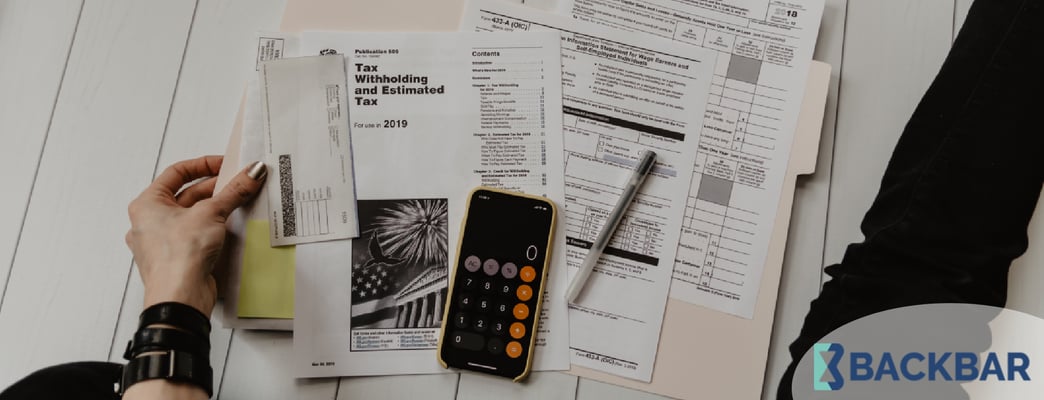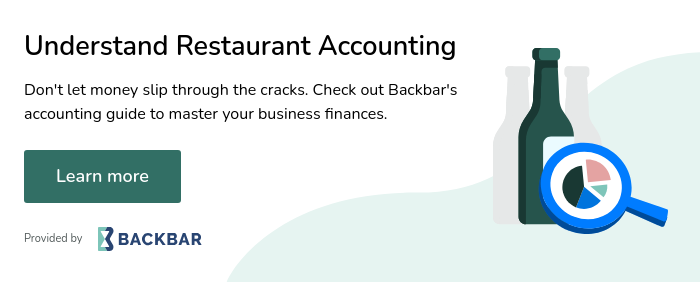Today Backbar will dive deep into the world of restaurant and bar taxes. If you're a restaurant or bar owner, you know that navigating the complex landscape of taxes can be overwhelming.
That's why we're here to provide you with everything you need to know about this crucial aspect of your business. From understanding different types of taxes to learning about deductions and credits that can save you money, our blog covers it all. We'll break down the jargon, explain the latest tax laws, and share valuable tips and strategies to help you stay compliant and maximize your profits. So, whether you're a seasoned restaurateur or just starting out, join us as we unravel the intricacies of restaurant and bar taxes and empower you to make informed financial decisions for your establishment.
Why is it important for bar and restaurant owners to understand their taxes?
Understanding taxes is crucial for bar and restaurant owners to ensure compliance with tax laws and minimize financial risks.
As a bar or restaurant owner, it is essential to have a solid understanding of your taxes. Not only does this help you comply with tax laws and regulations, but it also enables you to make informed financial decisions for your business.
By familiarizing yourself with the intricacies of tax requirements, you can minimize the risk of costly penalties, maximize deductions, and effectively plan for your financial future. Knowing your tax obligations will also allow you to accurately track and report your revenue and expenses, providing you with a clear picture of your business's profitability.
Additionally, understanding your taxes can help you navigate complex tax issues such as employee withholding, sales tax, and tips reporting, ensuring that you stay on the right side of the law and maintain a positive reputation within the industry.
Having a comprehensive understanding of your taxes empowers you to make informed decisions, protect your business from financial risks, and maintain compliance with tax laws and regulations.
Important Taxes for Bar and Restaurant Owners
Understanding the various taxes that bar and restaurant owners need to be aware of is crucial for running a successful business in the United States.
As a bar or restaurant owner, there are several important taxes that you need to be aware of in order to effectively manage your finances and stay compliant with the law. Here are the key taxes you should familiarize yourself with:
1. Sales Tax: Sales tax is a tax imposed by the state government on the sale of goods and services. As a bar or restaurant owner, you are required to collect sales tax from your customers and remit it to the appropriate state agency. The sales tax rate may vary depending on the state and locality where your establishment is located.
2. Payroll Taxes: Payroll taxes include federal, state, and local taxes that must be withheld from your employee's wages. These taxes typically include federal income tax, Social Security, and Medicare tax. As an employer, you are responsible for withholding these taxes from your employee's paychecks and remitting them to the appropriate government agencies.
3. Liquor Taxes: If your establishment serves alcoholic beverages, you will likely be subject to liquor taxes. These taxes are imposed by both federal and state governments and are typically based on the volume or value of alcoholic beverages sold. It is important to understand the specific liquor tax laws in your state and ensure that you are properly reporting and remitting these taxes.
4. Business Income Tax: Business income tax is a tax on the net income generated by your bar or restaurant. The tax rate and filing requirements may vary depending on the legal structure of your business, such as whether you operate as a sole proprietorship, partnership, or corporation. It is essential to keep accurate records of your business expenses and income to accurately calculate and file your business income tax return.
5. Employment Taxes: In addition to payroll taxes, there are other employment taxes that bar and restaurant owners need to be aware of. These include federal and state unemployment taxes, which fund unemployment benefits for eligible workers, and the Federal Insurance Contributions Act (FICA) tax, which funds Social Security and Medicare programs.
It is important to consult with a tax professional or accountant who specializes in the food and beverage industry to ensure that you are fulfilling your tax obligations accurately and efficiently. By staying informed about these important taxes, you can avoid potential penalties and better manage your finances as a bar or restaurant owner.
Tax Breaks All Bar or Restaurant Owners Should Be Aware Of
Explore the tax breaks available to bar and restaurant owners that can help reduce their tax burden and increase their profitability.
Owning a bar or restaurant comes with its fair share of financial responsibilities, but there are several tax breaks that can provide some relief. Understanding and taking advantage of these tax breaks can help bar and restaurant owners optimize their finances and maximize their savings. Here are a few key tax breaks that all bar and restaurant owners should be aware of:
1. Section 179 Deduction: The Section 179 deduction allows bar and restaurant owners to deduct the full cost of certain qualifying equipment and property purchased during the tax year. This deduction helps reduce taxable income and can be particularly beneficial for businesses that invest in new kitchen equipment, furniture, or technology upgrades.
2. Work Opportunity Tax Credit (WOTC): The Work Opportunity Tax Credit is a federal tax credit available to employers who hire individuals from specific target groups, such as veterans, ex-felons, or long-term unemployed individuals. Bar and restaurant owners can claim this credit when they hire employees from these target groups, providing a financial incentive for inclusive hiring practices.
3. Energy-Efficient Tax Credits: Bar and restaurant owners who invest in energy-efficient upgrades, such as energy-efficient appliances, lighting systems, or HVAC systems, may be eligible for federal tax credits. These credits can help offset the cost of implementing energy-saving measures while promoting environmental sustainability.
4. Research and Development (R&D) Tax Credit: While often associated with technology and manufacturing industries, the R&D tax credit is also available to bar and restaurant owners who engage in activities that improve their products, processes, or customer experiences. This credit can provide significant savings for businesses that invest in menu development, recipe testing, or innovative marketing strategies.
5. Small Business Health Care Tax Credit: The Small Business Health Care Tax Credit helps bar and restaurant owners with fewer than 25 full-time equivalent employees provide health insurance coverage to their employees. Eligible businesses can claim a percentage of the premiums paid as a tax credit, making it more affordable to offer valuable health benefits to their staff.
By familiarizing themselves with these tax breaks and consulting with a qualified tax professional, bar and restaurant owners can take proactive steps to minimize their tax liability and retain more of their hard-earned profits. It's essential to stay informed about the ever-changing tax laws and regulations to ensure compliance and optimize tax savings.





